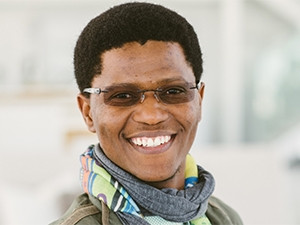
Neo Hutiri is an engineer with a Bachelor of Science in Electrical Engineering (UCT), a Masters in Engineering (Wits) and a real love of technology. He also contracted tuberculosis. In January 2014, he was diagnosed with this chronic disease and spent six months regularly driving back and forth to his local clinic to get treatment and collect medicine. While he built up his health, he sat in queues. He noticed other patients sitting in queues. He realised how long people had to wait to simply pick up their medication. And he had an idea...
"I started to think about solutions that could be applied to this problem and that is where my journey started," says Hutiri, founder of Technovera, the startup that recently won the #Hack.Jozi challenge, besting hundreds of hopefuls to take the impressive final prize of R1 million.
"I wanted to find a way of reducing the time patients spent waiting to collect their medication," says Hutiri. "This inspired me to create Technovera and a solution that uses technology to allow people with chronic medical conditions to collect their medication in minutes, not hours."
Smart lockers
Technovera's concept is a clever blend of technologies. Smart lockers are based onsite at wellness centres, clinics or community centres and loaded with pre-packaged medications. Once medicine is placed into a locker, the system sends an e-mail or SMS with a One Time Password (OTP) to the patient, notifying them that they can come through to collect it at their convenience. "Once they've been notified, patients can fetch their medicine and open the smart locker using the OTP, their mobile number and their ID number," says Hutiri. "The system is very secure, with multiple authentication points to ensure that only the right people get the right medication."
The solution is aimed primarily at thepublic sector to help mitigate the delays and waiting times experienced by patients. Currently, the average person waits between two and five hours to collect their meds at a healthcare facility, although this does vary between provinces and clinics. Technovera will reduce that time to five minutes.
"The potential impact on patients is enormous," says Hutiri. "They can now comply with treatments without having to worry about spending a lot of time waiting at their healthcare centre. Another benefit is that people don't have to take time off work to collect their medicines; they can just go to their smart locker after hours and fetch it, at their convenience. There are an estimated 2.5 million man hours lost to patients sitting in queues, waiting for medications, and this will make such a difference."
Startup boot cam
For the healthcare professional, the benefits are as impressive. Instead of spending the entire day issuing and dispensing chronic medications, they can take an hour filling the smart lockers and organising scripts.
Instantly, they are given more time to focus their attention on patients who need care. It is this long list of benefits and advantages that netted Technovera first place in the #Hack.Jozi Challenge.
Sponsored by the City of Johannesburg, the University of the Witwatersrand and the JCSE, #Hack.Jozi is described as a boot camp for startup entrepreneurs. The initiative helps brilliant young minds develop the skills and nous they need to transform their ideas into successful realities. It also rewards those who come up with the most inspiring and inventive digital ideas to help communities, the city and the country.
"They are looking for solutions that have the potential to scale and have a social impact," says Hutiri. "There were about 400 applicants, from which they selected the top 100. We then came in to pitch our ideas and from there the entrants were whittled down even further. We were given a lot of training throughout this journey, including mentorships and guidance into building pitches, products and articulating our business propositions. The last stage saw the top ten pitching for the prize, which we then won."
The event has given Technovera the boost it needed to take off and get into healthcare facilities. It has also changed Hutiri's life as he now has the tools, the mentorships and the awareness he needs to get his solution to the pilot stage. Currently, the startup is in talks with the Department of Health and a pilot project is scheduled for around August.
"It feels amazing to have won," he says. "I now have the ability to go and create solutions that can really impact people. That's the Holy Grail for any social entrepreneur."
This article was first published in the July 2016 edition of ITWeb Brainstorm magazine. To read more, go to the Brainstorm website.
* Article first published on brainstorm.itweb.co.za
Share